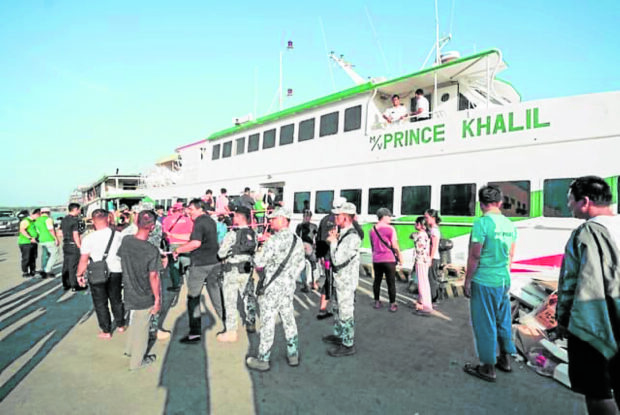
FERRY RIDE TO MALAYSIA The MV Prince Khalil, a fast craft, starts plying the route between Bongao, the capital town of Tawi-Tawi, and Lahad Datu in Sabah, Malaysia, in September. Officials are still preparing for the launch of the wooden-hulled cargo ship called “kumpit” to ply the same route in the next few weeks. —TAWI-TAWI GOV. YSHMAEL SALI FACEBOOK photo
DAVAO CITY, Davao del Sur, Philippines — Cases of smuggling and human trafficking are expected to go down along the country’s southern backdoor with the opening of a new sea route that would formally link the capital town of Bongao in Tawi-Tawi province and Lahad Datu town of Sabah in Malaysia, an official of the Mindanao Development Authority (MinDA) said.
Jonathan Miral, head of the international relations division of MinDA, said the new route, aside from encouraging more barter trading and economic activities between the two areas, would lessen the incidence of smuggling and human trafficking as trade and travel between the two areas would finally be mainstreamed, or coursed through proper government channels, including the need to present passports and other travel documents.
Milestone
Miral said the new route was launched in September using the 300-seater fast craft ferry MV Prince Khalil but MinDA and Bangsamoro officials were still looking forward to the launching of a wooden-hulled cargo ship, locally known as “kumpit,” that would ply the route hopefully in the next three weeks.
The operation of MV Prince Khalil signified a milestone in the effort to stimulate barter trade in the region and the East Asean Growth Area composed of Brunei, Indonesia, Malaysia, and the Philippines, according to an earlier statement by MinDA.
“Once trade in the area is formalized, it will hopefully lessen the entry of smuggled goods, the trading of contrabands, even the movement of undocumented people, because then, they will already have to secure a passport,” explained Miral.
Miral, who talked to reporters in a forum here on Oct. 4, said that MinDA had been working to formalize the trading route between Bongao and Lahad Datu since two years ago because most of the trading happening in the Bangsamoro Autonomous Region in Muslim Mindanao had always been informal ones.
“The shipping service that was launched was not really the nonconventional-sized ship — or the wooden-hulled kumpit, but a fast craft ferry service,” Miral told reporters.
“Still, it was a good development because now, we finally have a formal transport linkage from Bongao to Lahad Datu, [when] there used to be none. Now that it’s there, traders and [people] from Bongao can now regularly go to Lahad Datu for business or tourism,” he said.
The ferry plies the route three times a week, costing some P7,000 for a round-trip fare.
Miral said the trip would only take three hours, which, he added, would be a “big help for traders.”
Proper channel
He said Tawi-Tawi Gov. Yshmael Sali had strongly pushed for the opening of the route.
“The good thing about it is the cost of doing business would also lower down, as everything will already go through proper government channels and traders no longer have to incur ‘under-the-table’ costs for their operation,” Miral said.
He added: “All transactions will already be coursed through the Bureau of Customs, Immigration, Quarantine and even the Maritime Industry Authority, which will check the seaworthiness and safety of their vessels.”
Miral added they were still working on the documents of the wooden-hulled cargo vessel. “Hopefully, three weeks from now, we will finally have another launching,” he said.
While most of the goods coming from Lahad Datu would still be merchandised items, including rice and food, local authorities were working to increase the kind of agricultural goods that Tawi-Tawi could sell to Lahad Datu to improve the balance of trade in the area.